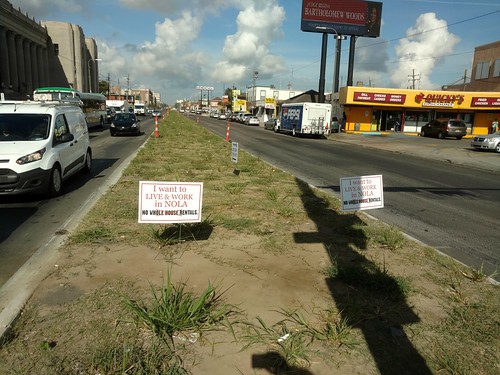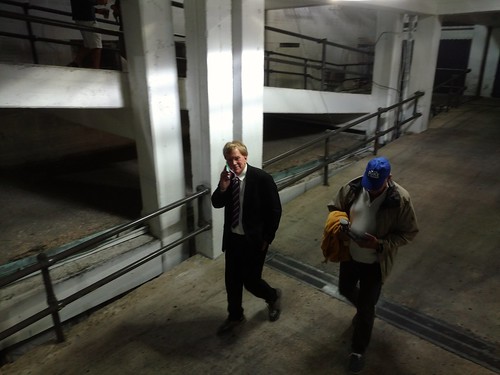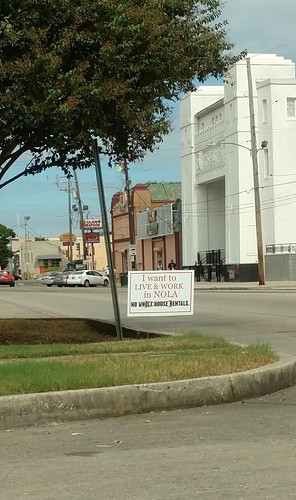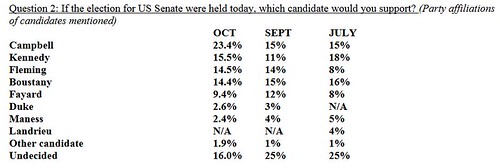
On Sunday night we took a walk over to Magazine Street to check out the Halloween display at a house calling itself, "Ghost Manor."
The animated tableau is now called Ghost Manor. It has grown to encompass upstairs windows, the attic and the entire front porch and yard. A sound system pipes eerie music synced with flying ghouls and skeletons and lighting that all works together. Animatronic skeletons channel Louis Armstrong on the front porch. To make all of this happen, Gentry had to learn electronics, video and audio editing and even stage lighting design and the software that runs it. He even built a dedicated gaming computer to run it all. He is modest about all of this.The display is really cool. There is a series of animations displayed on the upstairs windows where ghosts, skeletons and creepy eyeballs, and even the Slimer character from Ghostbusters appear. There is a graveyard scene on one side of the house and, on the other, an oak tree with a face.


These and other decorations in the yard are enhanced with colored lights and fog machines. The highlight, though, is the animatronic skeletons on the porch. They perform musical numbers from the movies "The Nightmare Before Christmas" and "The Jungle Book." You can still stop by there tonight if you're Uptown for Trick-or-Treat.
Also, if you walk a block up Second street into the Garden District, you'll see there's a house with a similar display that complements this. The silhouettes in the upstairs window act out various horror scenes in a loop.

It's neat stuff. But with all the sound and light going on (not to mention the nightly crowds) I started to wonder how it was that anybody actually lives in these houses... particularly the one on Magazine. I'm used to seeing Garden District houses that look more like museum pieces than homes. The owners come and go by a back entrance or driveway while the yard and the face of the house are meticulously manicured for display purposes. I don't understand exactly how that works in the lives of those residents, but I'm used to seeing it. I suppose Ghost Manor is like that.
Then I read the article on its backstory.
When local entrepreneur David Gentry and his wife Jessica purchased their stately Queen Anne Victorian home back in 2011, they had few thoughts about turning it into one of New Orleans' premier Halloween destinations.And it reminded me that most haunted house stories are about gentrification.
"We just fell in love with the architecture of it," Gentry said. "We looked at brand-new houses in Lakeview too but nothing compared to this place."
Located on Magazine at Second Street, it had been empty since Hurricane Katrina and needed a ton of work. "I think the condition it was in scared a lot of people off," Gentry said. But they had never owned a home before. "It was a big project."
But people were always asking Gentry if his big old hulk was haunted, and he began to think that maybe he could turn it into something fun.
Even though its subtext of displacement and gentrification might foreground race and violence and displacement, the haunted house film participates in the mystification of demographic change by convincing us that we are innocent, and the people we have displaced are monsters.In the coming years, many more of us can expected to be displaced as official city policy allows the homes we once had to become housing for visitors on their way to experience New Orleans's attractions like Ghost Manor, maybe. Will the fact that people used to actually live here haunt them? Or will they define us simply as "Old New Orleans" a monster that needed to be destroyed?
Displacement creates a paradox: We acknowledge the wrong that has been done but feel powerless to do anything about it. A sort of collective guilt springs up, a sense that we are insignificant cogs in the machinery of economic and social factors that create gentrification. This is particularly true for the middle class, who are often forced by economic necessity to move to gentrifying neighborhoods or to new suburban developments that have demolished pre-existing space.
Regardless of their place on the political spectrum, most people acknowledge that their government does some very bad things, and that they themselves might have to face the consequences. As in Malcolm X's famous comment on the assassination of John F. Kennedy -- "the chickens are coming home to roost" -- and following the Golden Rule, a system that maintains itself through violence will engender a violent response. The price of living in the comfort that globalizing imperialism can provide is the chance that we will be the victims of retaliatory violence -- like the Oklahoma City bombing and 9/11.
In the same way, the consequences of gentrification flicker on our radar regardless of whether or not we feel personally culpable. The question is, can we do anything about it? The modern haunted house film tells us that we can't -- that the only way to live in peace is to destroy the monsters we have already replaced.
Anyway, Happy Halloween. Make the most of your existence on the mortal plane while you're still here.






